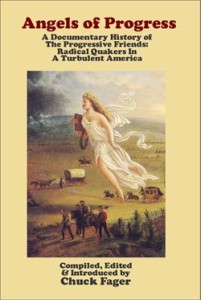.

[First posted in 2014.] Sometimes it can feel like a stretch, but there are at least a few of us who still believe the Religious Society of Friends, or Quakers, has some useful contribution to make in the world.
If this faith is not entirely in vain, that makes the group’s history potentially useful too: where it came from, how it has persisted, what it has and has not accomplished, and what that tale might suggest about its potential.
My 2014 book, Angels of Progress, undertakes to bring together and make visible a crucial piece of Quaker history that has been almost completely neglected and forgotten.  It had much to do with shaping an important sector of the movement, particularly its liberal wing, since about 1850, and into the twenty-first century. This influence seems to be continuing, though invisibly.
It had much to do with shaping an important sector of the movement, particularly its liberal wing, since about 1850, and into the twenty-first century. This influence seems to be continuing, though invisibly.
This neglected piece is the history of the Progressive Friends, told in the book through a selection of documents. It has been over a century since most of these writings have been seen outside archive reading rooms; and several of them have not previously been circulated at all.
It’s because of their obscurity that I decided to compile a broad selection, to offer a substantial array of evidence for the movement’s existence, trajectory, and impact. A companion volume, Remaking Friends, published later in 2014, put this history into a more compact narrative form.
Why have the Progressive Friends been so completely forgotten? In large part, this was their own doing. They were not institution-builders; indeed their whole ethos was anti-institutional, at least as far as traditional Quakerism was concerned. They did not keep membership lists; they built only a handful of buildings, of which but one is still standing.

Yet they did plead their case: preaching, lecturing, writing, agitating. They published articles, some produced tracts; occasionally their messages were taken down and preserved. A handful of the key figures published books, but not about the movement itself.
Why not? They were devoted to their cause – or rather causes – more than keeping track, or making names for themselves. This is admirably modest, but hell for historians.
What causes? Antislavery. Women’s rights. Temperance. Peace. Reforming a hidebound, insular Quaker establishment. Among others.
And beyond the specific burning issues was their conviction that everything was aimed forward, into making a better future: “progress.” Acting in accord with the “Divine Law of Progress” mattered more than filling archives or writing books about it.
Besides which, history in the early Progressives’ day seemed to move with breakneck speed: first toward civil war, then enduring its torment and trauma, through the tumultuous postwar years of Reconstruction into decades of what many call the (first) Gilded Age and the defeat of Reconstruction.
Many issues and struggles of that era tumultuous resonate strongly with those of our own. So the story of Progressive Friends has many useful parallels for Friends to ponder today. The fact that this movement reached its apogee in a civil war is by no means irrelevant. Their leading figures had worked for years to avoid this outcome, but then in large numbers they, like many other Friends, joined in on the Union side, and paid the bloody price.
Can we learn from them and others how to help avoid a rerun of this national tragedy?
